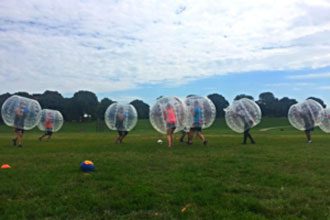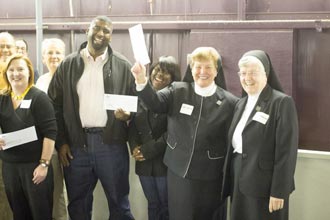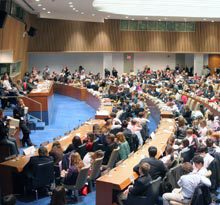 EC Montessori students will travel to New York
EC Montessori students will travel to New York  City in April to participate in the Montessori Model United Nations.
City in April to participate in the Montessori Model United Nations.
No matter your religious views, no one can deny that this time of year brings out the best in people. Acts of kindness, appreciative gifts and donations to those in need are abundant throughout the joyous month of December. And yes, children can be a bit materialistic this time of year; but, for the most part, we do our part in reminding them of those less fortunate and the true meanings of Christmas, Hanukkah and other celebrations of faith.
Natural stewards of good messages, children seem to spread the joy more than anyone if given proper direction from home, school and “the village.”
And though most children don’t know the reality of war, many understand the desire for peace. Their innocence is admirable even though the task of world peace is, in all probability, unattainable. But the challenge of creating global harmony is certainly worth the struggle, because, in essence, it’s just the right thing to do.
Regardless of your political beliefs, I like to think that most want to help, whether by government assistance, missionary work or charitable donations for those around the world needing assistance for disaster relief and defense of unjust humanitarian affairs. And who better to broaden our innate sense of compassion and open our minds to “what could be” than our children?
The upper elementary students (4th-6th Grades) at EC Montessori and Grade School are all members of an eleven-student delegation traveling to New York City to participate in the Montessori Model United Nations in April 2012.
The Montessori Model United Nations is a unique program. It is patterned after the traditional Model United Nations but allows the inclusion of upper elementary and middle school aged Montessori students. There are over 1,200 delegates from all over the world participating this year. As with the traditional Model UN, each delegate will research and write a position paper detailing a chosen country’s views on real world issues. The students must be knowledgeable, not only about current issues, but also about their delegated country. This year, EC students will be representing two countries, Mexico and Cuba.
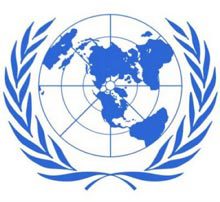 Taking on their ambassadorial roles in a Model UN simulation, teacher Elizabeth Wells’ students will research the issue that their UN committees will address. Model UN participants learn how the international community acts on its concerns about topics including peace and security, human rights, the rights of the child, child labor, the environment, food and hunger, economic development and globalization. Model UN delegates also look closely at the needs, goals and foreign policies of the countries they will represent at the event. The insights they gain from their exploration of history, geography, culture, economics and science contribute to the authenticity of the simulation. When the students arrive at the MMUN Conference, they will transform themselves into UN Ambassadors and assume the rights and responsibilities of world leaders. They will combine their imaginations to collaboratively create resolutions to our world’s most pressing problems. Students from every region of the world will role play as foreign diplomats and participate in simulated sessions of the United Nations General Assembly and other multilateral bodies in the UN system. While preparing for the conference, students develop leadership skills and research, writing, public speaking and problem solving skills that they will use throughout their lives. In addition, participation also encourages consensus building, conflict resolution and cooperation and the enhancement of leadership skills.
Taking on their ambassadorial roles in a Model UN simulation, teacher Elizabeth Wells’ students will research the issue that their UN committees will address. Model UN participants learn how the international community acts on its concerns about topics including peace and security, human rights, the rights of the child, child labor, the environment, food and hunger, economic development and globalization. Model UN delegates also look closely at the needs, goals and foreign policies of the countries they will represent at the event. The insights they gain from their exploration of history, geography, culture, economics and science contribute to the authenticity of the simulation. When the students arrive at the MMUN Conference, they will transform themselves into UN Ambassadors and assume the rights and responsibilities of world leaders. They will combine their imaginations to collaboratively create resolutions to our world’s most pressing problems. Students from every region of the world will role play as foreign diplomats and participate in simulated sessions of the United Nations General Assembly and other multilateral bodies in the UN system. While preparing for the conference, students develop leadership skills and research, writing, public speaking and problem solving skills that they will use throughout their lives. In addition, participation also encourages consensus building, conflict resolution and cooperation and the enhancement of leadership skills.
This will be the second time that EC Montessori has participated in the Montessori United Nations.
Elizabeth Wells, teacher of the Live Oak room at EC Montessori explains, “Having attended the first conference, I can confidently say that this experience is life changing not only for the students but for the adult participants as well. We all recognized that our students really can make a difference!”
The students at EC Montessori will be raising money through the Spring for this trip. They need a total of $15,000 and will be fundraising in a variety of ways. If you would like to donate money for this important journey, please call EC Montessori Director Terri Powell at 525-1141.
Congratulations to these students for taking an active role in supporting peace, development and human rights around the world.
The Montessori Model United Nations in many ways is structured to meet the following needs for the elementary student.
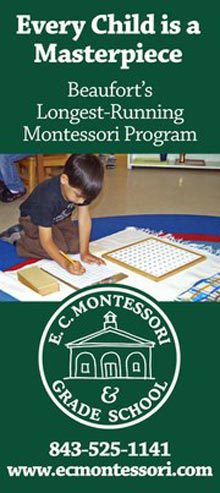 1. Elementary students need a curriculum that educates the “whole child.”
1. Elementary students need a curriculum that educates the “whole child.”
Taking part in the MMUN engages elementary students in many different ways. The intellectual element, which is so crucial for this age, is present as the students research a country, write an issue paper, and prepare to debate other students on serious global issues. The social need for this age is also fulfilled by the interaction of the students from different countries, schools, and cultures. During the debate stage of the MMUN, the students’ physical needs are met, as they are encouraged to meet in small groups and move around the meeting rooms as they try to align their interests with other countries.
2. Elementary students need exposure to real-world problem solving.
The MMUN allows elementary students to explore the real problems of the world and encourages them to discuss and negotiate possible solutions for issues that people face around the world such as contaminated water, the plight of the child soldier, and human-rights violations.
3. Elementary students need a curriculum that incorporates the three-period lesson.
The objectives of the MMUN—research, writing, debate, negotiation, and presentation—are specifically constructed to give the students short classroom demonstrations or lessons before allowing them the freedom to research and discuss the information they have learned with their peers and then using this information in a presentational format before student delegates of other countries.
4. Elementary students need to be responsible for their own learning.
Throughout the preparation and even during the conference, the students are responsible for the project. They are the ones who complete the research and decide the best resolution for the issue, and while meeting, they conduct the caucuses, negotiate with other student delegates, and write the resolution for each issue without their teachers’ interference.
5. Elementary students need continued practice in respect and civility.
The MMUN requires students to conduct themselves in a respectful manner towards the other delegates. Students quickly learn through role-playing that more success is achieved through civility in caucuses when important issues are at stake rather than discord.
6. Elementary students need discussion of important topics to formulate thoughts and develop critical-thinking skills.
Elementary classrooms are where the bulk of critical-thinking skills are developed. The exchange of ideas, the discussion of issues from all different aspects, and the resolution of problems, all which the MMUN requires, help elementary-age students think carefully about all the issues that surround them.
7. Elementary students need the continued use of narratives to keep them engaged in their education.
The Great Lessons are still very evident in the upper elementary classrooms. Students enjoy listening to narratives as new lessons are introduced. While studying the histories of their represented countries, students learn many narratives about different countries and are able to remember and share these and even use historical narratives in their issue papers to support their resolutions.
8. Elementary students need to be involved with justice from an individual aspect.
Elementary-age students seek justice from an individual standpoint. They instantly view situations as fair or unfair, not necessarily from a social perspective but from an individual one. The MMUN allows students to role-play a citizen from a different culture, which gives them a one-on-one perspective and understanding of any injustices suffered by the citizens of that country. This role-playing helps them see how other people endure injustices and what they do to end them.
9. Elementary students need to be challenged by multi-age groupings.
As in their classrooms, elementary students enjoy and are challenged by multiple ages. The MMUN continues this tradition by having elementary students of different ages working side by side, some with past experience from which the “rookie” students can caucus and learn.

